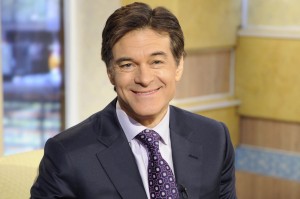The Not-So-Great but Powerful Pseudoscience of Dr. Oz
 Dr. Mehmet Oz (Photo by Steve Fenn/ABC via Getty Images)
Dr. Mehmet Oz (Photo by Steve Fenn/ABC via Getty Images) “Pay no attention to that man behind the curtain.” – The Wizard of Oz
Last Tuesday, the Senate Subcommittee on Consumer Protection convened a hearing on “Protecting Consumers from False and Deceptive Advertising of Weight-Loss Products.” In attendance was Dr. Mehmet Oz, the famous “Dr. Oz” of daytime television, whom Senator Claire McCaskill (D-MO) grilled on his larger-than-life claims about the many questionable weight loss “miracle” cures he has peddled on his show over the years.
McCaskill reproached Oz for the false hope he gives viewers when he employs what she called “flowery rhetoric” and stated, quite bluntly, “the scientific community is almost monolithic against you in terms of the efficacy of those three products that you called miracles.”
McCaskill isn’t exaggerating. Oz has frequently employed the words “miracle,” “magic,” or “revolutionary” when promoting weight loss methods. Medical experts would never employ these words in a scientific paper, and we humanists know as well as anyone that claiming something is miraculous is little more than a ploy to grab the attention of the gullible, like a preacher selling salvation. And yet, Oz commands a massive amount of authority and respect, which Senator McCaskill acknowledged in her plea for him to be more responsible. One recent study showed that poor women are much more likely to get their medical advice from television as opposed to physicians or the Internet, showing the disproportionate influence Oz has over already disenfranchised populations.
Oz conceded that, in reference to green coffee extract, one of the many weight loss scams he peddles, “I’m not going to argue it would pass FDA muster if it were a drug seeking approval,” and “I recognize oftentimes they don’t have the scientific muster to present as fact.” Dr. Oz is no dummy; he holds degrees from two Ivy League schools and has a professorship at Columbia. And yet, he lends his support to these drugs all the while understanding that they simply do not stand up to scientific scrutiny.
Oz defended himself by saying that he feels his job on The Dr. Oz Show “is to be a cheerleader for the audience,” which McCaskill rightly shot down as merely giving the audience “false hope.” Despite our increasing knowledge of the placebo effect and the way our psychology affects our immune system, it’s fair to say that hope alone doesn’t cure diseases. Oz even went so far as to compare his miracle cures to prayer, another kind of snake oil, while also conceding that he “can’t prove that prayer helps people survive an illness.” Duh. Senator McCaskill retorted that at least “prayer is free.” But Oz’s power is no laughing matter. Frauds and con-artists are well aware of the surge in popularity of the products Oz endorses and so covet his endorsements in order to scam well-meaning but misinformed people out of their hard-earned money, a phenomenon that has come to be known as “the Oz effect.”
Our culture is more saturated than ever with quacks like Dr. Oz, and in an environment like this the humanist mindset is particularly useful: a healthy dose of skepticism about the newest health fad. The recognition that a celebrity doctor promising effortless results is not so different from a preacher promising salvation. An affirmation that getting healthy is the result of human understanding, hard work, discipline, and determination, not simply a “miracle in a bottle.” The understanding that the scientific method gets results, and so medicine should be based on science, along with advocating for science education, so that people can see through the pseudo-science that permeates the media. These are just some of the ways humanism helps us evaluate our culture in a rational way while promoting our own wellbeing. Hopefully this hearing will, indeed, cause people to start paying attention to that man behind the curtain and, coincidentally, like the titular character from The Wizard of Oz, expose him for the fraud he is.
